Discover how Turkey's ancient biblical sites unlock mysteries of faith and prophecy, inviting you to explore its deep spiritual heritage.
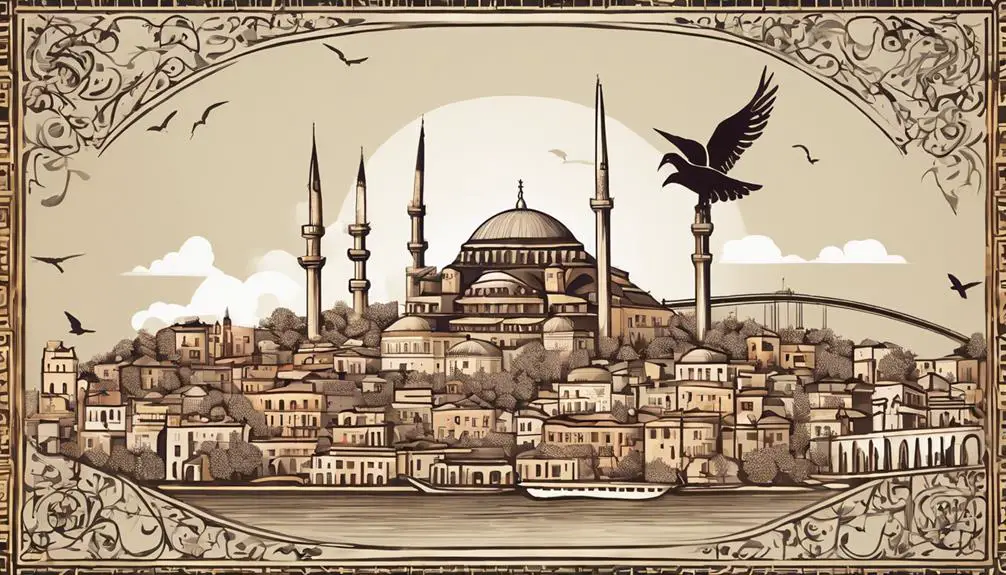
Modern Day Turkey in the Bible
You might think modern-day Turkey has little to do with the sprawling narratives of the Bible, but you'd be wandering in the desert of misconception.
This land, steeped in history, cradles the whispers of the Seven Churches of Revelation, echoes the footsteps of Paul's missionary journeys, and stands as the birthplace of the pivotal Council of Nicaea. As you trace the Biblical sites scattered across Anatolia, you'll uncover layers of spiritual heritage that might just reshape your understanding of its sacred texts.
But how does Turkey fit into ancient prophecies and what might that mean for its role in today's world? Stay with us as we explore these revelations together.
Key Takeaways
- Turkey's biblical sites, like Ephesus and Antioch, connect modern Turkey to early Christian history.
- The Seven Churches of Revelation in Turkey symbolize the spiritual journey within Christian belief.
- Turkey's role in the Council of Nicaea highlights its importance in shaping Christian doctrine.
- Paul's Missionary Journeys in Turkey helped establish the country as a foundational land for Christianity.
The Seven Churches of Revelation
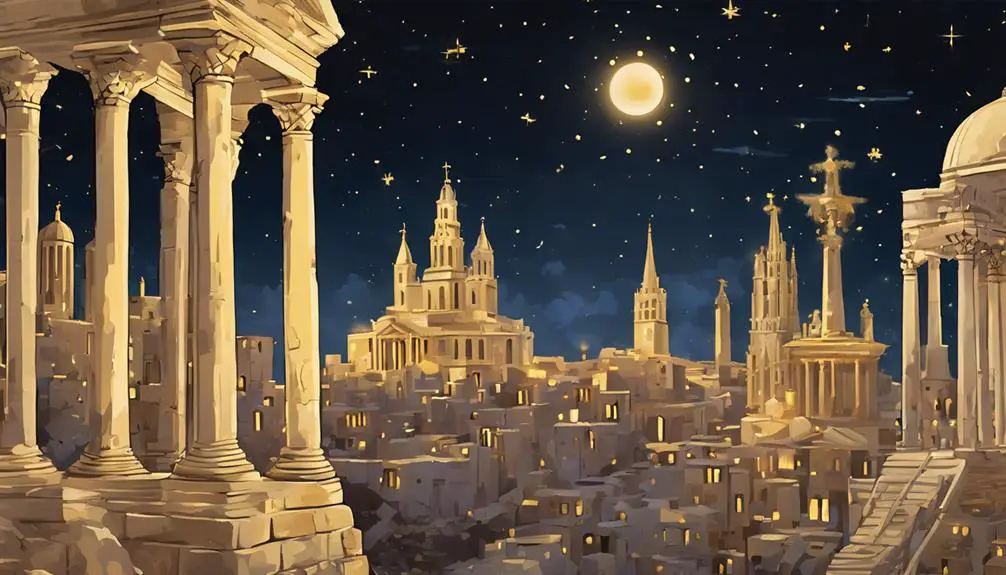
In analyzing the Seven Churches of Revelation, one must recognize that they aren't merely historical entities but also serve as a profound spiritual metaphor within the context of modern-day Turkey. These churches, addressed in the Book of Revelation, embody a range of spiritual symbolism and church lessons that transcend their original, ancient audience. They're emblematic of the spiritual journey, challenges, and the evolving nature of faith communities over time.
Each church is depicted with unique commendations, rebukes, and counsel that, while specific to their situation, encapsulate timeless principles. The spiritual symbolism inherent in these messages prompts you to reflect on the broader spiritual conditions prevalent in the church today. For instance, the church in Ephesus is commended for its perseverance but is also warned about losing its first love. This serves as a poignant reminder of the importance of maintaining fervor and sincerity in one's faith journey.
Furthermore, the challenges faced by these churches, including persecution, complacency, and doctrinal corruption, mirror issues that modern churches must navigate. By understanding the spiritual symbolism and church lessons embedded in the narratives of these seven churches, you can glean insights into maintaining a vibrant, faithful community amidst contemporary challenges.
Paul's Missionary Journeys
Paul's missionary journeys, traversing vast regions of the ancient world, were pivotal in the spread of Christianity and the establishment of early churches across what is now modern-day Turkey and beyond. You'll find that these expeditions weren't merely about preaching; they also involved significant encounters with Roman persecution and the collection of Ephesus artifacts, which provide a tangible link to the nascent Christian communities.
Aspect |
Description |
|---|---|
Ephesus Artifacts |
These artifacts, unearthed in what was once a bustling metropolis, offer clues to the daily lives and spiritual practices of early Christians. |
Roman Persecution |
The backdrop of Paul's mission, this persecution shaped the narrative of Christianity, forcing it to evolve and adapt in its struggle for survival. |
Church Establishment |
Paul's tireless efforts led to the founding of numerous churches, cementing Christianity's foothold in the region. |
Cultural Exchange |
These journeys weren't a one-way street; they facilitated a rich exchange of ideas, deepening the cultural and religious tapestry of the ancient world. |
Analyzing Paul's journeys, you'll uncover layers of historical and religious significance. His travels through modern-day Turkey were instrumental in the dissemination of Christian beliefs, despite the shadow of Roman persecution. This era, marked by the emergence of Ephesus artifacts, offers a unique window into the early Christian world.
The Council of Nicaea
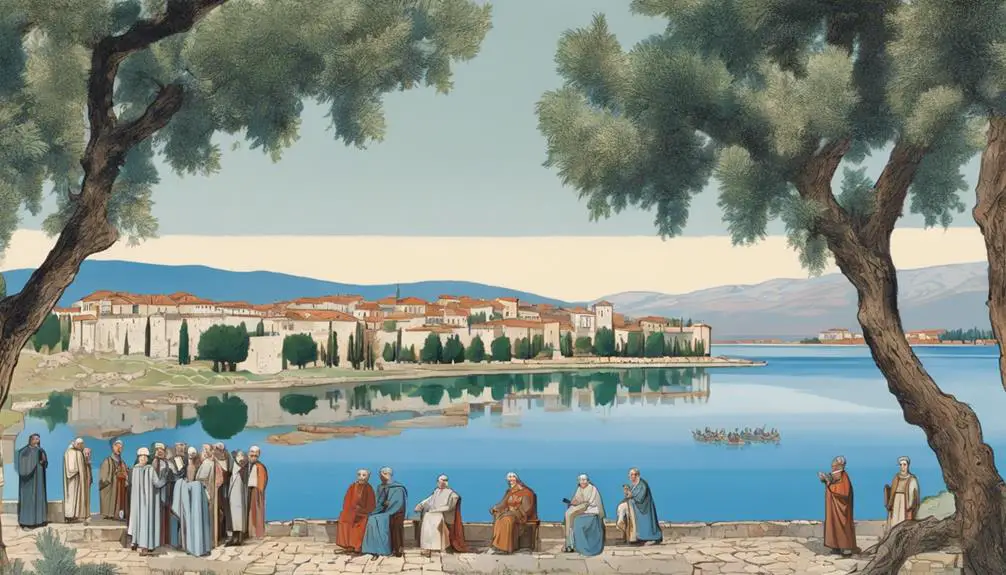
Several centuries after Paul's missions, the Council of Nicaea, convened in 325 AD, marked a pivotal moment in Christian history by addressing the Arian controversy and establishing foundational doctrines. You'll find that this council's significance extends far beyond a mere historical event; it was a cornerstone in shaping the theological landscape of Christianity. The Arian controversy, centered around the nature of Christ's divinity, posed a substantial threat to church unity. Arianism, advocating that Christ was created and thus not co-eternal with the Father, challenged the core of Christian belief.
In response, the Council of Nicaea methodically dissected these arguments, ultimately rejecting Arianism and affirming the consubstantiality of the Son with the Father. This was a critical juncture in Christian theology, emphasizing Christ's divine nature as equal to that of God the Father. Additionally, the council played a crucial role in canon formation, setting a precedent for the establishment of orthodox doctrine and the boundaries of Christian scripture. Although the canon wasn't officially closed at Nicaea, the council's decisions influenced later determinations of what writings were considered authentically apostolic and thus authoritative.
Biblical Sites in Anatolia
Building on the foundational doctrines established by the Council of Nicaea, it's crucial to explore how Anatolia, modern-day Turkey, serves as a living testament to the early Christian community and its sprawling biblical narratives. This region, rich in history and culture, offers a unique window into the past, with its myriad of biblical sites that continue to draw scholars and believers alike. Among these, the exploration of Mount Ararat and the remnants of the Hittite civilization stand out for their significant biblical connections and archaeological value.
Site |
Biblical Significance |
Notable Discoveries |
|---|---|---|
Mount Ararat |
Traditional resting place of Noah's Ark |
Ongoing expeditions and research |
Hattusa |
Capital of the Hittite Empire, mentioned in the Bible |
Extensive ruins showcasing Hittite architecture and cuneiform tablets |
Ephesus |
Significant early Christian community |
The Great Theatre and the Library of Celsus |
Antioch |
One of the earliest Christian communities |
Cave Church of St. Peter |
Tarsus |
Birthplace of Paul the Apostle |
Historical ruins reflecting diverse cultural influences |
Anatolia's landscape is dotted with these and many other biblical sites, each telling a unique story of faith, history, and civilization's evolution. The careful study and preservation of these sites not only enrich our understanding of biblical narratives but also highlight Anatolia's pivotal role in the development of early Christianity.
Prophecies and Turkey's Role
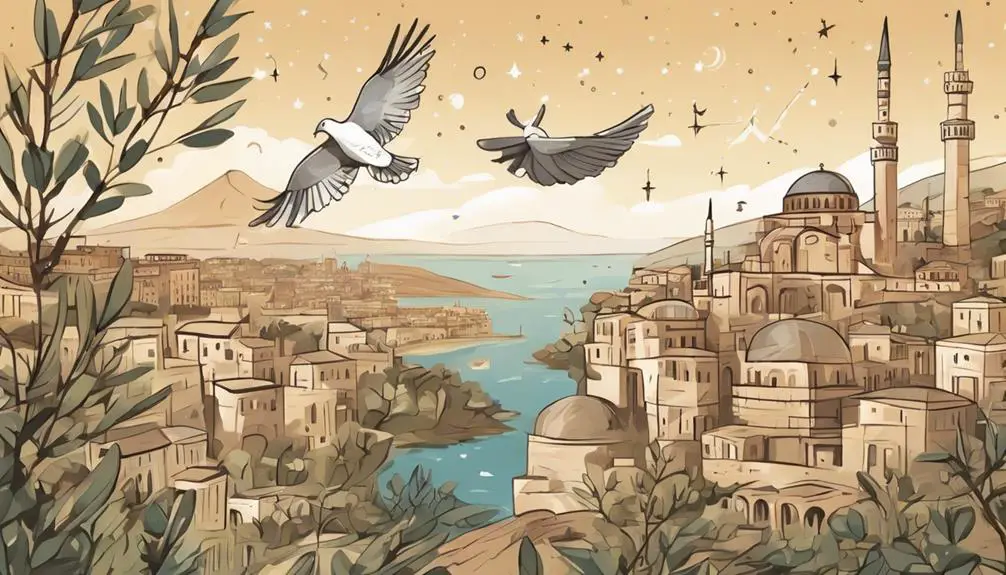
Turkey's geographical and historical landscapes play a critical role in the unfolding of biblical prophecies, serving as a bridge between ancient texts and contemporary interpretations. When you delve into the prophecies, it's evident that Turkey's position, straddling two continents, isn't just a matter of geopolitical interest but also of prophetic significance. The references to Gog and Magog in the Bible, often interpreted by scholars to involve regions that are part of modern Turkey, highlight the country's pivotal role in eschatological narratives. This connection isn't merely symbolic; it roots Turkey deeply in the discussions about end-time scenarios, making its historical and future actions a point of keen interest for theologians and scholars alike.
Moreover, the identification of the Armageddon location, while traditionally associated with the plains of Megiddo in Israel, also sees interpretations that broaden the scope to include the vast landscapes of Turkey, considering its strategic military and historical relevance. This analytical perspective doesn't only enrich our understanding of ancient prophecies but also challenges you to reconsider Turkey's place in modern theological discourse. As you explore these connections, it becomes clear that Turkey's role in biblical prophecies is both significant and multifaceted, bridging the past with potential future fulfillments.
Frequently Asked Questions
How Does the Geographical Landscape of Modern-Day Turkey Compare to Biblical Times, and What Impact Does This Have on Biblical Interpretation?
You're exploring how the geographical landscape has evolved from biblical times to now, focusing on modern-day Turkey. This shift significantly impacts biblical interpretation, especially when considering climate influence and agricultural development.
These elements shape understanding of historical contexts, enriching your analysis of biblical narratives. By methodically examining these changes, you gain insights into how environmental and agricultural transformations over time can alter interpretations of ancient texts, providing a richer, more nuanced understanding.
In What Ways Has the Rise of Islam in Turkey Influenced the Preservation or Transformation of Biblical Sites and Christian Heritage?
The rise of Islam in Turkey has woven a rich tapestry of religious syncretism, blending Islamic architecture with the Christian heritage of biblical sites. This fusion has both preserved and transformed these ancient spaces, showcasing a unique coexistence.
Through a scholarly lens, one observes how Islamic dominance has methodically influenced the landscape, merging the past with the present, and shedding light on the complex interplay of faiths over centuries.
Are There Any Lesser-Known Biblical Figures or Stories That Are Believed to Have Connections to the Regions That Are Now Part of Turkey?
You might be intrigued to discover that several lesser-known biblical figures and narratives have ties to regions within today's Turkey. Among these, Noah's Ark is notably linked to Mount Ararat, though it's a subject of ongoing debate and fascination.
Additionally, the Revelation mentions the Seven Churches, located in Western Turkey, offering a unique lens into early Christian history. These connections highlight Turkey's layered and impactful biblical significance, inviting a deeper exploration.
How Do Contemporary Turkish Archaeological Discoveries Continue to Shape Our Understanding of Biblical Narratives?
In your quest for knowledge, you'll find that contemporary Turkish archaeological discoveries, such as ancient inscriptions and numismatic evidence, are reshaping our understanding of biblical narratives.
These unearthed treasures provide a fresh lens through which we can view ancient texts, offering new interpretations and insights.
What Role Do Modern Turkish Cultural Practices and Traditions Play in the Interpretation or Celebration of Biblical Events and Figures Today?
You'll find that modern Turkish cultural practices, including Turkish cuisine and folk dances, enrich the celebration of biblical events and figures today. These traditions offer a unique lens through which the biblical narratives are interpreted, adding layers of cultural significance that bridge ancient texts and contemporary understanding.
Analyzing how these practices influence the perception of biblical stories, one can appreciate the deep-rooted connections between culture and spirituality in today's context.
Conclusion
In your exploration of Turkey's biblical tapestry, you've wandered through ancient whispers and divine echoes, from the fervent gatherings of the Seven Churches in Revelation to the pivotal Council of Nicaea.
Each step on this hallowed ground, trodden by apostles and prophets, unveils a layer of spiritual heritage intricately woven into Anatolia's fabric.
Turkey's silhouette in prophecy and history doesn't just mirror the past; it subtly hints at a transcendent narrative, inviting a deeper contemplation of faith's enduring legacy.

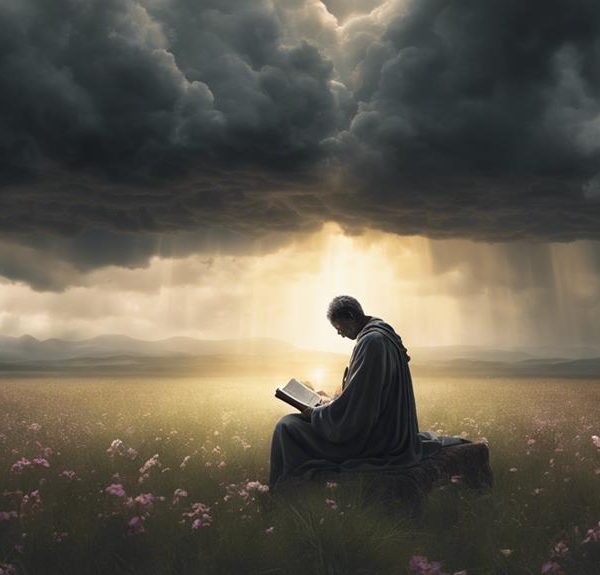

Sign up